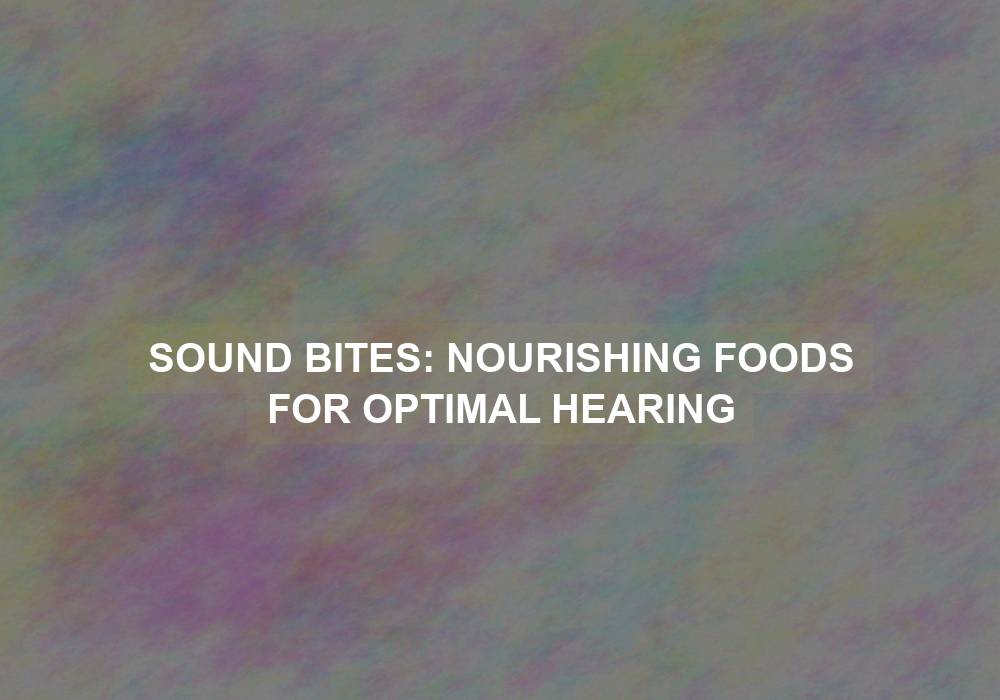In today’s fast-paced world, it is crucial to prioritize our hearing health. One effective method of supporting optimal hearing is by nourishing our bodies with the right foods. Just as our overall health depends on a balanced diet, our auditory system also relies on specific nutrients to function optimally. In this article, we will explore the power of sound bites – foods that can help promote healthy hearing.
The Importance of Nutrition for Hearing Health
Before delving into specific foods, it is important to understand why nutrition plays a vital role in maintaining excellent hearing health. Our ears are complex organs that rely on a delicate balance of various components to process sound effectively. Nutrients such as vitamins, minerals, antioxidants, and fatty acids contribute to the overall health of the auditory system.
By incorporating a diet rich in these essential nutrients, we can support the structure and function of our ears, reduce the risk of age-related hearing loss, and even prevent certain hearing conditions. Let’s take a closer look at the sound bites that can provide our ears with the nourishment they need.
Omega-3 Fatty Acids
Omega-3 fatty acids are renowned for their numerous health benefits, including promoting cardiovascular health and brain function. However, their role in maintaining healthy hearing is often overlooked. Research has shown that omega-3 fatty acids help protect against age-related hearing loss and reduce the risk of developing conditions like tinnitus. These healthy fats can be found in a variety of foods, including fatty fish such as salmon, mackerel, and sardines, as well as walnuts, flaxseeds, and chia seeds.
Incorporating omega-3 fatty acids into your diet not only supports the overall health of your auditory system but also provides benefits for other areas of your body. These fats have been linked to improved cognitive function, reduced inflammation, and even a lower risk of heart disease. By including omega-3-rich foods in your meals, you can nourish your body while giving your ears the support they need.
Antioxidant-Rich Foods
Antioxidants are powerful substances that help protect our bodies against oxidative stress caused by harmful free radicals. When it comes to hearing health, antioxidants play a vital role in preserving the delicate structures of the inner ear and preventing damage that may lead to hearing loss.
Including antioxidant-rich foods in your diet is a simple and effective way to support your auditory system. Blueberries, strawberries, spinach, kale, broccoli, and green tea are excellent sources of antioxidants. These foods not only provide essential vitamins and minerals but also offer an extra layer of protection for your ears. Incorporating a variety of colorful fruits and vegetables into your meals ensures a diverse range of antioxidants, promoting overall health and well-being.
Magnesium
Magnesium is a crucial mineral that supports various bodily functions, including nerve transmission and muscle relaxation. In terms of hearing health, magnesium has been found to help protect against noise-induced hearing loss and may even improve tinnitus symptoms.
To incorporate more magnesium into your diet, consider adding foods such as almonds, cashews, spinach, avocados, and legumes. These foods not only provide magnesium but also offer a wide range of other essential nutrients. However, it is important to note that excessive magnesium intake may have adverse effects, so it is best to consult with a healthcare professional before considering any supplements.
Vitamin C and E
Both vitamin C and vitamin E are powerful antioxidants that play a significant role in maintaining overall health, including hearing health. These vitamins help protect against oxidative damage, reduce the risk of hearing loss, and improve blood flow to the ears.
To ensure an adequate intake of vitamin C, incorporate foods such as oranges, strawberries, kiwi, and bell peppers into your diet. Vitamin E can be found in nuts and seeds, spinach, and sunflower oil. By including these vitamins in your meals, you can provide essential nourishment to your auditory system, supporting its overall health and function.
Zinc
Zinc is a mineral that plays a crucial role in numerous bodily functions, including maintaining a healthy immune system and supporting wound healing. It also contributes to the proper functioning of the auditory system.
Research has shown that zinc supplementation may help reduce the risk of age-related hearing loss and improve tinnitus symptoms. Oysters, beef, pork, chicken, yogurt, and fortified cereals are all excellent sources of zinc. However, it is important to consume zinc in moderation, as excessive intake may interfere with the absorption of other nutrients.
Conclusion
Maintaining optimal hearing health requires a holistic approach, and nutrition plays a significant role in supporting the auditory system. By incorporating sound bites – nourishing foods rich in omega-3 fatty acids, antioxidants, magnesium, vitamin C and E, and zinc – into our diets, we can give our ears the essential nutrients they need to function at their best.
Remember, a balanced diet is key, and it is always best to consult with a healthcare professional or nutritionist to ensure you are meeting your individual dietary needs. So, start incorporating these sound bites into your meals and snacks, and embark on a journey towards healthier hearing.
